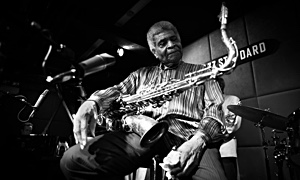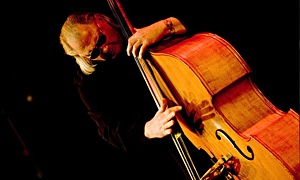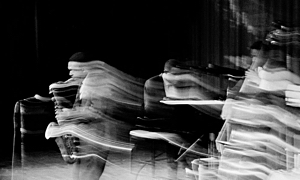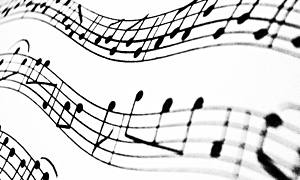Home » Jazz Articles » On and Off the Grid » Practice, Do You? Part 2-3
Practice, Do You? Part 2-3
I began studying the guitar when I was seven years old. I hated my teacher and I didn't practice much, but when I changed teachers' and I went to Joe Geneli, I regained a love for the guitar that I first had when I was four years old when I first saw Roy Rogers sing and play. It was with Joe that I began to practice. I found an hour a day was sufficient, but as I got older and the music he gave became harder, I practiced longer.
When I was fourteen I switched to Sal Salvador. Sal was pretty well known in the fifties and sixties and it was the right move for where I was as a guitarist. Sal gave me a slew of books, which included the Arbans Trumpet Method, Johnny Smith Aides to Technique and many more. My practice routine during the school year went up to five to six hours a day. I would practice early in the morning before school. Two hours after, break for homework, sports and dinner and resume practicing at about 8:30pm. During the summers I was practicing up to twelve hours a day. I wanted to be as good if not better than Johnny Smith or Wes Montgomery or any of the greats of that day. As I got older my points of reference became John Coltrane, Eric Dolphy, Thelonius Monk, Cecil Taylor, Albert Ayler and all the players that moved me.
Through all of this, not one teacher taught me how to improvise or explained advanced harmony and theory. I took this upon myself to learn and it was part of my practice routine along with learning tunes and chord melodies.
When I became a full time musician and worked six nights a week till 4 AM in the morning, I would practice five to six hours before going to work. In 1963 with the emergence of the Beatles, every kid wanted to play guitar. Before you know it I had 110 students. It took away from my practicing, but I managed to get a couple of hours in before my teaching began and I always played with the students.
I'm 71 now and I still practice some days more than others. Through the years there were times when I felt I needed to go to another level and I would put in eight hours per if I had the time. And it's still the same. If I feel I need to get to another level, I go back to practicing longer hours.
I also spend a lot of time focusing on music. What I mean by that is, I hear music all the time in my head. I mentally practice all the time and before I re-harmonize or arrange a standard, or compose, I think about it and hear it first, so when I'm ready, it just flows through me. The same goes for writing this article. I thought about it for a long time and now the words are flowing on to the paper.
While I was thinking about this article, I thought it would be a good idea to contact some of my friends and see if they felt the same as I did. I asked only two questions:
1. Do you still practice and how much?
2. What do you practice?
I contacted a lot of musicians never expecting such a response. If everyone had answered me, this would have been a book instead of an article. Some answers were short and some were extremely long and some were hilarious.
I was amazed by some of the answers and I think you will be too.
Some of the artists are famous and some you may not have heard of, but that really doesn't matter. What matters is the dedication. I am truly touched and very hopeful for the future of jazz by these responses.
I placed the answers and artists under instrumental category. Because I am a guitarist and know a lot of guitar players, I posted the guitarists' comments last.
Saxophone, Cont.
Ron Aprea
I practice every day. It's tough when I'm arranging but at the end of the day I spend at least an hour with the alto. When I'm not writing I'll practice all day long...I like to create new ll V's and play them in all 12 keys, tunes, overtones, long tones, finger exercises, and maybe a Bach invention. I like the Aebersold tracks, especially Cherokee, All The Things You Are and Confirmation in 12 keys. Always searching for new ways to approach old tunes. That's pretty much it. (I lead a dull life.)
Oliver Lake
I practice usually minimum of hour and a half.; longer if preparing for a concert. I practice music for upcoming performances. If there are no performances I practice scales, exercises, original tunes and long tones.
George Garzone
I work on my triadic chromatic approach everyday of my life.
Sabir Mateen
I'd better practice. There are many things that I'm trying t get to but cannot practice as long as I used to. I 'm working on the same thing I've been working on for the last 35 years, my sound.
Clarinet
Mort Weiss
After I retired I started playing Jazz clarinet-E.G. Bop-Hard and post Bop-and my last album was a total free form solo date (where I over dubbed on my self) some call it playing with them selves. I recorded with some of the heavies, Joey DeFrancesco (He did two dates with me and club dates in and around L.A. and Hollywood. Sam Mostand Bill Cunliffe and some small concerts in L.A. with Terry Gibbs and some of the (usual suspects) Hollywood hero's. I'm the guy that quit playing for 40 years and came back on the scene in 2001. To this date have put out eleven albums for those of you in Odessa (albums are the same as CD's)
I'll be 80 years old next year, (I've stopped looking into the mirror) who is that old wheezed dude that's hiding in there-Dam and that's no reflection on any thing including this article-where are my meds? So, what does one have to do to keep their chops in (the phone might ring), shape? First it helps if you are a bit obsessive and compulsive in the way you do things. One must practice (without fail) at least six days a week-for at least 1 & a 1-2 hours each day. I mean All of the scales in all of the keys and then the chromatic ones. All of the most used and then some chords with any and all inversions. All that I've just mentioned must be done at all tempos from largo to presto vivace-and esp. For horn players tonged and slurred long tones for all horn players, starting at the lowest working note of your ax, starting at triple P to triple F and back down again to P (that's one note) and proceed upward chromatically to the note and repeat the same drill once more going to the highest working note on your horn and then start down to the beginning note. One does this for the rest of ones life. "If you wanna be a bad mo-fo ain't no other way if your playing real music!"
Chris Kelsey
The question "Do you still practice?" took me by surprise. My first impulse was to respond, "You might as well ask whether I still breathe," but I suppose, as I get older I can better understand why some musicians cut down. It's true that the longer you play, the more the law of diminishing returns kicks in; progress can come more slowly and require more effort.
I know for a fact that the cumulative effect of my practice still bears fruit, because I'm a much better changes player now than I've ever been, and I only really began concentrating on that aspect of my playing in recent years. Beginning in my 40s, months pass when I practice tunes almost exclusively, sometimes with a computer rhythm section, sometimes along with records, sometimes unaccompanied. I'll never be a great bebop player, per se, because I don't really "feel" it—when it comes down to it, I feel a closer connection to blues, funk, and rock than to older styles of jazz. But I work on it, and it enriches my own music.
My horns are never in their cases except on the way to a gig. I leave them on their stands at the foot of my bed, the easier to grab one and blow when the mood strikes, which is often. I practice daily, almost always for upwards of an hour, minimum. I will take a day or two off after a particularly intense gig, I'm a very physical player, and there are times when I'm so spent, I'll need some time off to recover. I can get a little rusty after these short layoffs, but within an afternoon I usually have everything back up and running. When I practice just to maintain my chops, as sometimes happens, I'm either tired or being lazy. There are so many things I don't know about making music. Discovering them is no chore; on the contrary, it's why I play.
Trumpet
Herb Robertson
Yes, I still practice the trumpet (have to with this instrument. It would eat me up if I didn't). I do what I call a "general maintenance" type of routine when I have no gigs for the immediate future. I do long tones (very necessary for brass instruments) in a spider web fashion. What I mean by that is that I start with a hub center note in the upper middle register and then gradually spread the intervals up and down always returning to that hub center. Dynamics always. Then some flexibility routines (spider-web) and some range extension exercises. When my chops feel just right I usually finish for the day unless I have a tour coming up with written compositions. That's when I hit that stuff. I never practice if I have a gig that day.
Dennis Gonzalez
I practice my horn from time to time, but my practice involves working in other ways. Usually my standard practice involves music given to me by other composers, especially if I am going to play their music, and especially if it is notated. The last really difficult wood-shedding I did was to play a concert in Colorado with the young, gifted alto saxophonist/composer Aakash Mittal. He is finishing up a residency in Calcutta as we speak, and his music reflects his Indian roots. It is difficult music for me because it is full of runs and notes using different modes and odd time signatures. I had to learn to feel the music and beat and sound as I went along. I'm not sure how well I succeeded. I felt like a first-time cornet student.
I consider that composing on other instruments and listening exercises are essential practice. It gives me another perspective which is important for garnering freshness and creativity.
I usually begin with simple patterns, which come entirely from listening to myself at the moment. I will repeat a sequence of improvised notes until I feel that it's time to change one note, then another and another, until the sequence, pacing, rhythm, and tone have changed. This was taught to me by the great Jimmy Lyons.
Matt Lavelle
I have no choice but to practice because I play two very different horns in trumpet and alto clarinet. I have a full time retail job plus I'm taking two classes in school plus 2 yoga classes a week and gigs plus 2 students and a girlfriend plus my blog, but I still make as much time as possible which is often 1-2 hours a day no matter what.
Trumpet is always first. Trumpet is the foundation for cornet, fluglehorn, and pocket trumpet and I play them all. Trumpet is the most unforgiving horn in the world because the embouchure requires daily maintenance. Half of my practice is keeping my chops intact. It's been this way for 25 years and with slow progress it's taken me the entire time to get to where I actually want to be. My progress has been hindered by a full time job the entire time. I wish I had money in the bank but as always I subsist week to week. Looking to change that.
I gave up Bass clarinet for the time being because of these time constraints. I gave all my bass chops to the alto clarinet. I'm very focused on getting a real clarinet sound as taught to me by Sabir Mateen. I have a sound on this horn that has been cast aside by just about everyone and I'm not backing down from trying to establish it's legitimacy as a bonafide member of the great jazz horns.
After chops I practice speaking my own musical language in every key. I work on airflow, hot Yoga has changed everything. I take pieces of my favorite melodies, change them into every key and then change the note of resolution on a quest to be more lyrical on my own terms. I studied with Ornette Coleman and Harmolodics is the backbone of everything I do. Another reason to have an Eb horn like the alto, that's part of OC's master plan. At times I will practice playing songs and playing changes, but it has to be one's that I enjoy like Ellington and Strays. Monk on a fairly regular basis. After a few rounds of chords I get bored and have to open it up.
Joe McPhee
I do still practice, but not nearly as much as I should or need to. Normally I try to keep my chops up in order to get to ideas with as little thought as possible, thinking and consideration of choices and or consequences slow things down. The brass instruments require the most time and practice. A day off of the horn usually requires a week to get up to steam. I practice Long tones and ballads. Anybody can play a million notes faster than greased shit (if you'll pardon the gross and way too graphic expression and catch attention, but you can't hide in a ballad. In a ballad, you are totally exposed and naked.
Dave Douglas
I practice every day. My Laurie Frink routine takes 2 hours if I have the time! Then I practice the music I am writing and the music I have to learn. Writing is part of practicing for me, extending concepts and exploring curiosity. Also exercising other concepts related to my practice in every facet.
Jack Walrath
I still try to practice everyday. My routine comes out to between 2—3 hours a day. 2) I have an extensive warm-up. I mainly practice music. I do a lot of play-along's for a couple of hours. When I practice long tones I also am circular breathing.
Paul Smoker
I still practice 1.5-to 2-hours/day maintenance, and 4-5 hours close to a gig or concert. I work on fundamentals (trumpet players will know these sources):
- From Schlossberg Daily Drills & Technical Studies—long tones, lip slurs & trills, extreme dynamics (ppp to fff), ranges exercises, etc.
- From Clarke Technical Studies—1 to 4 complete sections extending into both "above high 'C'" and pedal registers, varying speed and dynamics.
- Major and melodic minor scales and modes in every key into the high register and the pedal register (down to E, the lowest sounding note on the bass), and often diminished scales. ii-V-I arpeggios (cycles) in every key—start improvising on them.
- The famous excerpt from Stravinsky Histoire du Soldat where 16ths are in groups of five, double-tonguing backwards. If it's clean my tonguing is cool for the day.
- Maybe a tune or two to check playing on changes.
Voice
Andrea Wolper
I still practice. The word "still" in this question surprises me. As for how much: Not anywhere close to enough, but as much as I seem to be able to manage. On the rare days when I feel I've hit "enough," I feel better.
I practice from a large bag of resources. Some things stay pretty constant, while others float in and out of rotation over periods of weeks or months. The current rotation includes vocal exercises and improvisation practice, ukulele, a bit of piano, working through a course of modal and rhythmic training, readings on vocal pedagogy, and learning new music (or reviewing old, as necessary) for upcoming gigs. I suppose this is separate from writing and arranging music, though it doesn't feel separate to me. Items that are a bit more in the background at the moment include exercises from various vocal jazz books, sight-singing practice, working with various music theory apps, and more.
Kendra Shank
I still practice and am always learning new things about my instruments (voice & guitar). How much I practice varies. I'm not consistent.I practice 30-45 min. of vocal exercises & scales as a warm-up with attention to breath control, placement, tone and intonation. After that, I'll work on a song: either learning a new one or practice soloing over changes of a song in my repertoire. Or I might just free improvise, often using a loop station and other electronics to spontaneously compose multi-voiced pieces. As a vocalist I have my instrument with me at all times, so I can practice while walking down the street, doing intervallic exercises,improvising, or just exploring what kinds of sounds I can make with my voice.
On guitar my practice begins with very slow scales, resting every 10 minutes (because I'm retraining after an injury), until I'm warmed up. Then I work on songs with chords, since most of my playing is geared toward accompanying my singing.
Nora McCarthy
Daily attention to whatever may be the focus at the time is part of the "practice." It is continuing and inclusive. Whether I'm preparing for a concert or advancing a new idea, I devote as much time beforehand as is necessary, but as a daily thing, let's put it this way, "I'm always singing." Specific as to "what" I practice, the answer is "development" and "awareness." Keeps me very busy.
Bass
Michael Bisio
Honestly I am one of those weirdo's who even after more years than I care to admit loves to practice and like to think I practice daily, upon consideration there are some exceptions, e.g. on Tuesday Matthew Shipp Trio recorded a Duke Ellington tribute for Rogue Art, it was such a wonderfully intense experience I was barely able to move on Wednesday let alone play bass. That being said this type of rest (time off) is extremely beneficial to completely digest the experience, a great value to any artist.
At this point in time I probably average 2 hours a day and can imagine the reality is probably between 1-4 hours, 4 being the extreme. My practice routine varies, lately I have enjoyed studying the masters on an aurally microscopic level where the pitches and time are just the beginning the process, and in repetition it can be very myopic and must remind myself the ultimate goal is macro. I try to remember there I a difference between practicing and playing but always leave time to practice playing. The goal is to be ready
Dominic Duval
I don't practice. I play. I think I've had enough practice. Doing is the best medicine.
Continue to Part 3
< Previous
The Russian Concerts Volume 1
Next >
The New Straight Ahead
Comments
Tags
Dom Minasi
On and Off the Grid
United States
Sal Salvador
Johnny Smith
Wes Montgomery
John Coltrane
Eric Dolphy
Thelonius Monk
Cecil Taylor
Albert Ayler
Ron Aprea
Oliver Lake
George Garzone
Sabir Mateen
Mort Weiss
Joey De Francesco
Sam Most
Bill Cuniffe
Terry Gibbs
Chris Kelsey
Herb Robertson
Dennis Gonzalez
Aakash Mittal
Matt Lavelle
Ornette Coleman
Joe McPhee
Dave Douglas
Jack Walrath
Paul Smoker
Andrea Wolper
Kendra Shank
Nora McCarthy
Michael Bisio
dominic duval
For the Love of Jazz
 All About Jazz has been a pillar of jazz since 1995, championing it as an art form and, more importantly, supporting the musicians who create it. Our enduring commitment has made "AAJ" one of the most culturally important websites of its kind, read by hundreds of thousands of fans, musicians and industry figures every month.
All About Jazz has been a pillar of jazz since 1995, championing it as an art form and, more importantly, supporting the musicians who create it. Our enduring commitment has made "AAJ" one of the most culturally important websites of its kind, read by hundreds of thousands of fans, musicians and industry figures every month.























